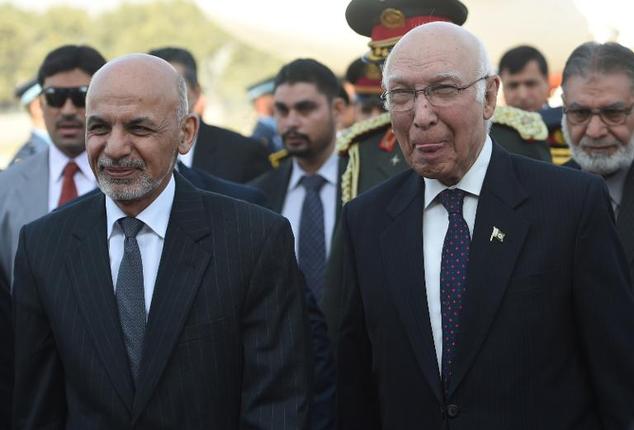Afghanistan, Pakistan Take Tentative Steps To Ease Tensions
Afghan President Ashraf Ghani (left) walks alongside Pakistani special advisor Sartaj Aziz

NEW DELHI: This week, Pakistan and Afghanistan held high level talks in Kabul in a bid to ease tensions that were spurred on by news of Taliban leader Mullah Omar’s death. The news was followed by a particularly bloody weekend in Afghanistan, with Afghan President Ashraf Ghani directly implicating Pakistan for aiding and abetting the militants. Omar’s death also put on hold a peace dialogue initiated between the government and Taliban representatives, brokered by Pakistan.
Although no details have been released regarding the one-on-one interaction between Afghan President Ghani and Pakistani national security adviser Sartaj Aziz, terrorism charges and the peace dialogue were likely the prominent point of discussion.
The meeting took place on the sidelines of the sixth Regional Economic Cooperation Conference on Afghanistan, RECCA. After the meeting, Ghani addressed the RECCA participants. He acknowledged that since taking office last year, his government followed a new strategy by reaching out to Pakistan, in contrast to Hamid Karz'2ai’s government that was vocally critical of Pakistan.
However, Ghani seemed a little less optimistic than previously. “The path forward will not be smooth. There will be setbacks," he said. "Pakistan’s leaders express the desire for peace, but face the challenge of controlling those forces that believe that an unstable and weakened Afghanistan is better than a strong and confident neighbor.” “Nevertheless, the quest for peace will continue, and we are confident that an accommodation can be reached that lets both Pakistan and ourselves develop the economies that we need to provide prosperity to our people,” Ghani said.
The meeting comes as international pressure pushing for Afghanistan and Pakistan to mend relations, levelled largely by the US, grows.
Pakistan and Afghanistan have shared a shaky relationship, with a large number of Afghans blaming Pakistan for supporting and hence perpetrating the Taliban. Ghani decided to reach out to Pakistan despite the criticism, with some going so far as to accuse Ghani of sleeping with the enemy.
Ghani’s decision to improve ties is directly linked to Pakistan’s influence over the insurgent, which, in turn, is ironically the main source of ammunition for Ghani’s anti-Pakistan critics. When Ghani came to power in September last year, he quickly signalled a change in policy. Ghani soon after being sworn-in visited Pakistan, and then Pakistan’s army chief and head of intelligence visited Kabul. Afghanistan and Pakistan’s tense equation had sunk to an all-time low under the presidency of former Afghan President Hamid Karzai. Karzai had been openly critical of Pakistan -- accusing the neighbouring country of supporting the Afghan Taliban and providing refuge to the group’s leadership.
Delegations from the two countries made visits across the border; six Afghan army cadets were sent to Pakistan for training; military efforts were coordinated across the shared border; and Ghani and Pakistani Prime Minister Nawaz Sharif both issued statements in support of cooperation and bilateral ties.
The two countries recently signed an agreement between Afghan National Directorate of Security (NDS) and Pakistan’s Inter Services Intelligence (ISI) -- a move widely criticised by the camp opposing the betterment of ties.
The shift in policy seemed to be bearing fruit, with reports circulating that the Afghan Taliban -- under pressure from Pakistan was on the verge of agreeing to talks with the Afghan leadership. This was huge. For the first time in thirteen years -- since the US invasion of Afghanistan -- the Taliban, which has thus far maintained that the Afghan government is illegitimate, was ready to initiate a peace process.
Then Ghani’s trip to Washington happened, where US President Barack Obama announced the decision to slow troop withdrawal. The Taliban, in turn, issued a statement vowing to continue fighting. "This damages all the prospects for peace, Taliban spokesman Zabihullah Mujahid said of the announcement. “This means the war will go on until they are defeated.”
All this has been the source of much criticism. In an interview with The Guardian, former Afghan President Hamid Karzai -- said that the country’s historic struggles against British imperialism and Soviet invasion will have been in vain if it succumbs to pressure from Pakistan.
This view was echoed by Karzai’s associates who sat in on the interview. Rangin Dadfar Spanta, a former foreign minister and national security adviser said that the policy amounts to the humiliating “appeasement” of a hostile power who would never change its ways. In a similar vein, Omar Daudzai, one of the most influential officials of the Karzai era who served as chief of staff and interior minister, predicts, “There could be a bloody summer, there will be fighting and there will be disappointments on the dialogue table from time to time.” Daudzai, a former ambassador to Islamabad, added that whilst he thought Ghani’s attempts to woo Pakistan were “courageous,” they would ultimately fail to change the country’s behaviour. “He has taken controversial steps that his predecessor didn’t take, and now we have to wait to see whether the Pakistani side is sincere or not,” he said. “But I am far more sceptical than I ever was before about Pakistan’s sincerity.”
And this is by no means an isolated view. An important figure within Afghanistan, Karzai echoes a distrust that runs deep with the Afghan people.
And while the world optimistically hoped that Ghani’s changed strategy would lead to concrete results, the latest flare up is proof of the pudding that is not easy on a solution to insurgency in the region, and a reminder that Pakistan is perhaps not yet ready to entirely cooperate.



